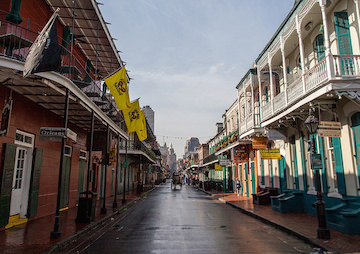10 Years After Katrina, New Orleans Is ‘Gentrification’s Ground Zero’
In the 10 years since Hurricane Katrina, many of New Orleans' low-income black residents have been displaced, with gentrification entailing a dramatic transformation of the city's class structure and cultural identity. Bourbon Street, New Orleans. (jkbyram / CC BY-SA 2.0)
Bourbon Street, New Orleans. (jkbyram / CC BY-SA 2.0)
In the 10 years since Hurricane Katrina, New Orleans has transformed into “gentrification’s ground zero,” according to historian Megan French-Marcelin. Writing in Jacobin magazine, she dissects the city’s redevelopment and rebranding into a “neoliberal playground for young entrepreneurs.”
“One need only look at the harrowing weeks and months after the storm,” French-Marcelin writes, “to see that reconstruction would be used to implement a series of revanchist reforms that further deregulated labor, undermined unions, diminished educational and employment opportunities for working-class people, and excised public and affordable housing from the speculative urban landscape.”
The evidence to thwart any progressive redevelopment agenda is startling. For example, “In just over a decade—from 1996 to 2007—the city managed to close 85% of the city’s public housing, adopting a system of ‘mixed-income’ projects and vouchers instead.”
When it comes to public education, “within the first few months after the storm, nearly 7,500 predominantly black public school teachers were unilaterally fired, with no process or explanation, the first shot in a relentless battle to dismantle the city’s traditional public schools. In the next few years,” French-Marcelin explains, “education profiteers, led by Teach for America (TFA) and school privatization guru Paul Vallas, turned New Orleans schools into the first all-charter school system in the nation.”
Many of New Orleans’ low-income black residents have been displaced, with gentrification entailing a dramatic transformation of the city’s class structure, as the article makes clear:
In the years after Hurricane Katrina, cultural commodification has been extended to the business of rebuilding and preserving the city’s unique customs. Transplant communities, exemplified most conspicuously by Solange Knowles (Beyoncé’s younger sister), have effectively taken up the mantle of a grassroots cultural reclamation: renovating historic shotguns, opening stores with local wares, and engaging the tradition of second lines for private events.
The appeal of this vibrant rebuilding effort is in its reproduction of a bourgeois bohemian paradise. However, excavated cultural authenticity offers less of an opportunity to rebuild the working class it claims to reflect (that would take jobs, housing, and a commitment to public services), and more a means to commodify culture anew.
The declining poverty rate does not speak to some miraculous redistribution of wealth to working-class families, but rather to their forced exit amid a corresponding influx of high-income residents. By 2010, nearly 23% of Bywater residents made incomes of $75,000 or more.
New Orleans’s new economy, which rests on an unstable model of tourism and contingent professional labor, does not and will not benefit the city’s working class. Like most cities around the country, job insecurity, union busting, and state-orchestrated dismantling of social and public services have become status quo in New Orleans.
Massive and successive layoffs to city employees, many of whom were already at or near the poverty line, have occurred amid the city’s entrepreneurial boom. Nearly 400 state employees found themselves out of work this past year, and dozens of school board employees will receive pink slips by the end of the summer.
Official unemployment rates in New Orleans hover at just over 6.5% — but for black workers that rate is estimated to be much higher. A full 27% of families and 39% of children live below the poverty line, and in 2014, just 4.5% of the city’s workforce was unionized. In numbers that have changed little since the 1970s, the two lowest earning quartiles (40% of the labor force) make just over 7.5% of the city’s total income.
Read the article in full here.
–Posted by Roisin Davis
Your support is crucial…With an uncertain future and a new administration casting doubt on press freedoms, the danger is clear: The truth is at risk.
Now is the time to give. Your tax-deductible support allows us to dig deeper, delivering fearless investigative reporting and analysis that exposes what’s really happening — without compromise.
Stand with our courageous journalists. Donate today to protect a free press, uphold democracy and unearth untold stories.






You need to be a supporter to comment.
There are currently no responses to this article.
Be the first to respond.